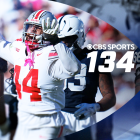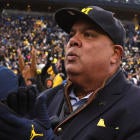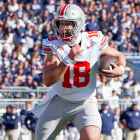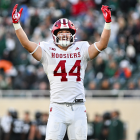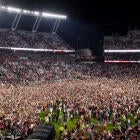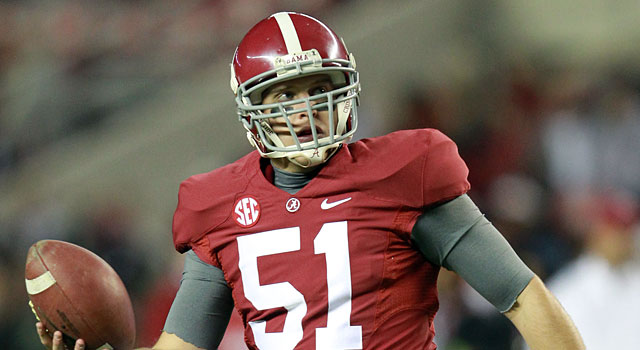
It's been almost three years since April 27, 2011, the day tornadoes devastated the state of Alabama. More than 250 people in Alabama lost their lives due to the tornadoes. Among them was Ashley Harrison, the girlfriend of Crimson Tide long snapper Carson Tinker, who was huddled with her in a closet trying to survive the storm.
The tornado destroyed the house, shredding it, and in the process, sucked Tinker, Harrison and everyone else there up, shooting into the sky. Tinker's body landed some 50 yards away from where their house had been. When he awoke hours later in a hospital, he learned Ashley didn't survive after having been ripped from his arms. Tinker suffered a concussion, injured his wrist and his ankle, which would require a skin graft. For some, Tinker, as an Alabama football player, became one of the faces of the tragedy.
In the aftermath of the tornadoes, the entire state of Alabama pulled closer together to aid in the healing, and Crimson Tide coach Nick Saban often spoke about how his team would be part of that, offering to help in any way they could. Some eight months later, Alabama won another BCS National Title and Tinker spoke about how that helped "bury the pain" for him and many others.
Since then, the Crimson Tide went on to win another national title, the 24-year-old Tinker moved on and is now playing in the NFL for the Jacksonville Jaguars. He's also written a book, "A Season To Remember: Faith In The Midst Of The Storm" about what he went through, but also about how he's grown from it all. Earlier this week, I caught up with Tinker who had been a big part of the 2011 documentary I worked on with Joe Tessitore and Martin Khodabakhshian called Roll Tide/War Eagle, to talk about his new book and what he's learned from it all as well as about the impact so many have had on him.
Q: What compelled you to share your story?
Tinker: Well, I never thought I would be an author, it was just an opportunity that I felt like God had presented me and I really wanted to use it to help people. My mantra since the tornado has been that people ask for blessings but I ask to be a blessing and I felt like this was just another opportunity for me to be a blessing to people. So many people reached out to me and helped me get through the tough times and I wanted to be able to give back. They were all just the smallest things: strangers coming up to me saying they were praying for me or fans sending me cards. People that I have no way of thanking or no way of giving anything back to, they reached out to me and didn't expect anything in return.
There was this third grade kid that wrote me a letter a few months after the tornado and said that he lost one of his classmates in the tornado. He told me that at first he was really sad but after he saw my story and how I wanted to help people that it inspired him to go start a lemonade stand and that he had already raised over $100 for his community and that he was trying to raise more.
I'm giving all of my proceeds to charity, the whole reason for me writing this book is to help people. I literally went through a storm, but everyone has storms in their lives: family issues, financial problems, sickness. Something that I learned is that you either live in vision, or you live in circumstance. My vision is to be able to help people. This book was just another part of my vision.
Q: What was the hardest part of writing this book for you?
Tinker: The book was obviously difficult to write, but reliving everything was definitely the hardest part. Throughout the whole process I learned that only the wounded have the power to heal. I wanted to take everyone through what I think will be the most difficult thing I will ever face, and show how God used it for good.
Q: In what ways has your life changed (and perhaps your perspective) since the day of the tornadoes?
Tinker: I believe that since the tornado I have found my purpose. I was very ambitious before the tornado but I didn't really have a purpose. Now I'm trying to help people.
Q: Did you find the writing process cathartic given all you've been through and the spectrum of emotions over the past few years?
Tinker: I wrote the book to talk about the lessons that I had learned but writing everything down gave me an opportunity to reflect on everything and I picked up on a lot of the little details that I had looked over.
Q: You spoke to us for Roll Tide/War Eagle a few years ago about the tragedy. When you think back to that first season/year after, what stands out to you?
Tinker: I'm really proud of my team and not only how well they responded in giving back to the community, but sticking to the process and working hard throughout the whole season. We lost to LSU in the regular season but we did not want to be defined by that. We knew we still had a great opportunity and we wanted to make the best of it. We kept fighting and ended up back where we wanted to be and then won the BCS championship.
Q: We talked in that documentary a lot about the bond revealed by the tragedy between Alabama and Auburn folks, is there an example of that that really has resonated with you from your personal experiences?
Tinker: I hate to brag about Auburn but I always thought it was really cool how the players and the athletic department reached out to the city of Tuscaloosa. Sometimes everyone gets caught up in the rivalry and it's good to see people stepping out of their comfort zone to help people.
Q: You said that all proceeds from this book will go to charity. What is the charity you're involved with and why is it so close to your heart?
Tinker: I recently started a 501c3 called the Be a Blessing Foundation. The purpose of the foundation is to help people going through hard times. I wanted the vision of it to be broad so we can do a lot of cool projects with it. Our first project is to help a family that the father has cancer and their house is being condemned . We are going to build them a new house.
We are also in the process of partnering with the business school at Alabama, so we are really trying to get the students more involved in the community and helping people. I'm really looking forward to seeing what the foundation can do for people.
Q: What would you like people to take away from reading your story?
Tinker: You either live in vision or you live in circumstance and that God has you right where you are in life for a reason.







